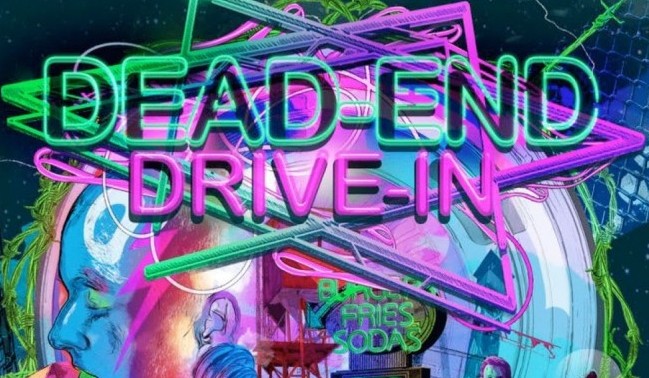
Dead End Drive-In Blu-ray Review

The latest release from Arrow Video is a classic piece of Ozploitation, as 80s a film as can be imagined; albeit a now forgotten classic B movie. Directed by classic cult director and apparently a Quentin Tarantino favourite, Brian Trenchard-Smith, perhaps best known for making BMX Bandits (1983), the film that first introduced the world to Nicole Kidman, Dead End Drive-In is a garishly coloured piece of dystopian action. Set in the near future after the world has seen catastrophes, global financial collapses and a break down in law and order crime and violence is running the streets. Roving gangs of street punks are tormenting, carjacking and robbing people with a corrupt police seemingly powerless to combat crime. The film opens with our hero, Crabs (Ned Manning) out for a jog past litter strewn dark streets when he sees his girlfriend (Natalie McCurry) at a petrol station. While he chats to her a graffiti covered car pulls up filled with a gang who try to intimidate the friends but are eventually chased off. Crabs’ brother works for a salvage firm that collect cars after carjackings, again having to fight off punk gangs. One day Crabs takes his girlfriend to a drive-in in his brother’s beloved souped-up red Cadillac. After the film has finished they realise that the wheels have been taken. When Crabs approaches the drive-in manager he is told that he won’t be able to leave that he is basically imprisoned in this place with all the other social misfits. At this camp he finds other young delinquents who are trapped there but are kept distracted by movies, drugs and alcohol but he fights to make his escape from the place.
Made in 1986 the garish colours and the very 80s soundtrack are evident throughout the whole film looking like a cheap 80s pop video. The dystopian plot is not new to Australian cinema – indeed they are still making such films such as the recent The Rover (2014). But the film has other antecedents that are better known including the cult classic The Cars That Paris (1974) about a small town that deliberately causes vehicles to be wrecked in order that they can make salvage. More so, the Mad Max films fit neatly into this category of dystopian gang violence. As with many Australian films, Dead End Drive-In is most assuredly offbeat but its premise does not sit very well. The acting is dodgy and some of the action and fight sequences are not very well handled, despite the big pyrotechnics ending – surprising given the work Trenchard-Smith has done with stunt men (including a documentary included in the extras). It has (a very 1980s) style to it and holds up as a period piece with the New Wave punk look and its uses of graffiti; the graffiti artist for the film who painted all the wallscapes and graffitied cars was by renowned Australian graffiti artist Vladimir Chevepanoff who claims on one of the extras that the film prevented him from drifting into a life of crime. One of the other extras on the disc is a public information film directed by Trenchard-Smith about the dangers of smoking in hospitals. The package, as impressive as it is, is really for Ozploitation fans only and is unlikely to reach any new audiences.
Chris Hick
